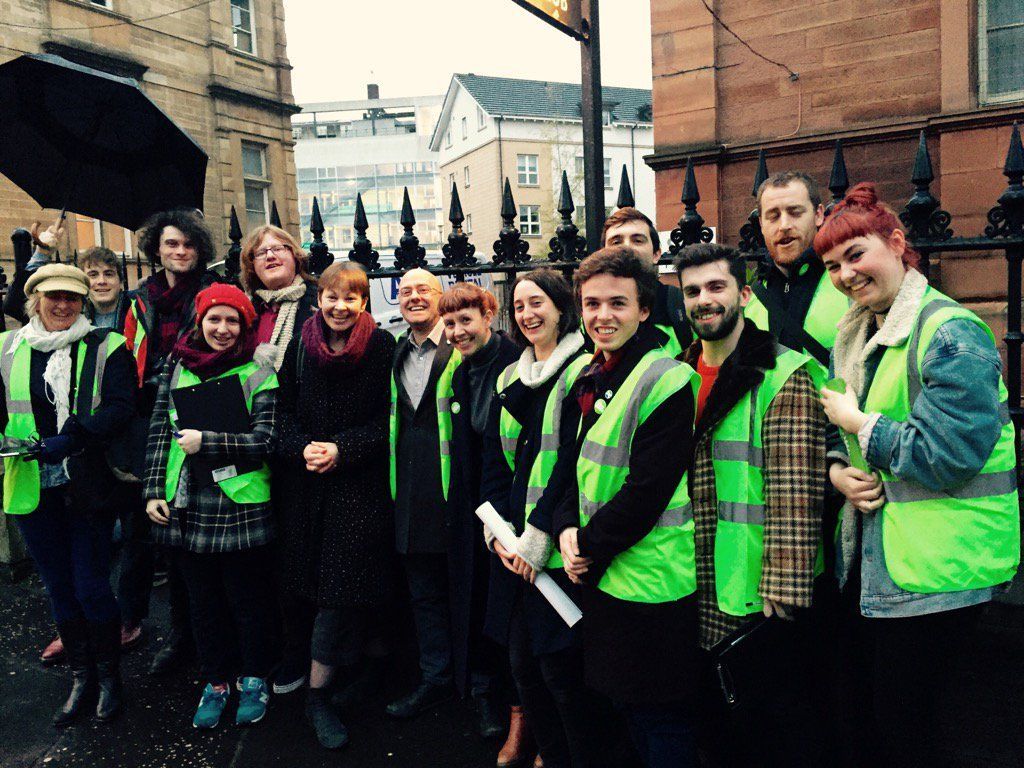I have just returned home from 6 hours of leafleting. A few days ago I did four hours of canvassing for the Scottish Green Party for the upcoming Scottish elections. Last week I knocked on doors for four or five hours to promote and discuss a tenants organisation I am helping to form, Living Rent, an idea which originated in our campaign for rent control.
In my local area – where I have been door knocking – there are many students and young professionals, categories of population which are most likely to vote green. In last year’s general election it was in this area that the Greens received the most votes (6.2%).
It is an area with a history of local campaigning; green councillors and the co-convenor of the Scottish Green party are running for a seat here. As one of the most expensive areas to live in Glasgow it also has some of the highest rates of council tax, houses in multiple occupation and a large number of student tenants.
Needless to say, I came across a variety of people, some supportive (one man helped me deliver green leaflets today), some angry (people have slammed the door in my face), some confused. I learned a lot from this. Firstly, I found out what issues people care about; secondly, it became clear to me why people vote for the greens and, thirdly, it helped me to understand why people are considering voting for right-wing parties. This is why I am convinced that door knocking is one of the best tools for political parties to connect with voters, to gain supporters and to counteract right-wing views. Here are my arguments:
• It makes people feel part of the community: One of the reasons people vote for right-wing parties is because they feel that the past was better than the present, whether it concerns jobs, education or health. Right-wing parties have capitalised on this feeling by using slogans such as ‘we will lead the country back to better days’ and by adopting an anti-immigrant stance in order, so they claim, to protect our public services. They also refer to broken neighbourhoods where nobody knows their neighbours and everything is unstable. In a certain manner the breakdown of community relations is true, people are much more likely to move, less likely to settle and zero hour contracts make the purchase of property very difficult. All this creates fear, fear of the other included. By talking face to face to the people you live next to, you are building a connection and help people to feel part of something bigger. No e-mail or leaflet can replace such a personal connection.
• It connects politicians to voters: Earlier this week Caroline Lucas (the only green Member of the House of Commons and former Member of the European Parliament) and Patrick Harvie (a green Member of the Scottish Parliament) joined us in our door knocking campaign. Going to the voters directly, discussing issues and explaining the voting system had a positive effect and also helped to attract more green volunteers than usual. Additionally, it helped to destroy the myth that politicians don’t care about what stops people from engaging in politics. One of the reasons UKIP appeals to people is because they are seen as the antidote to other parties, they claim to represent the people. Left-wing parties should go out there and show that this is not necessarily true.
• It exposes the myths in right-wing arguments: In a recent interview David Coburn, the Scottish UKIP representative, played down the impact of Climate Change. Door knocking gave us a great opportunity to tell the electorate why he is wrong. It is also a chance to confront people with the real facts on immigration, which right-wing parties so often misrepresent. Often people on the left-wing side of politics shy away from these debates, which is how the right-wing parties gain media attention. Talking to people directly confronts left-wing campaigners with people who consider voting based on such right-wing myths and forces them to stand up for their beliefs.
• It helps to gather information on the sort of change people need: When campaigning for Living Rent I came to ask very specific questions, but often the conversation would turn to another topic, a problem was raised I previously did not consider or the information I had was not up to date. Having the right information is very important when targeting voters but also for recruiting supporters – in both cases door knocking is often the very first interaction. One of the reasons that right-wing parties do so well is because they are backed by big businesses and rich donors. As the left-wing parties normally don’t have this kind of support their only option is to work hard and gain the trust and support of people.
• It helps us to promote an alternative view: Both the Scottish Greens and Living Rent seek to change Scotland fundamentally. The Scottish Greens wish to create a Scotland with a fairer council tax, more teachers and more environmental jobs. Living Rent wants a Scotland where people can afford to rent homes, live in decent conditions and are members of a tenants organisation. Without media attention or funding, it is hard to explain these visions to people. For going from door to door we don’t need many resources; all we have to do is establish a connection with the other person and show them what an alternative Scotland could look like.
You can download the article in PDF here.
Kate Samuels (1990) is based in Scotland and is the International Officer for the ‘Scottish Young Greens’.


